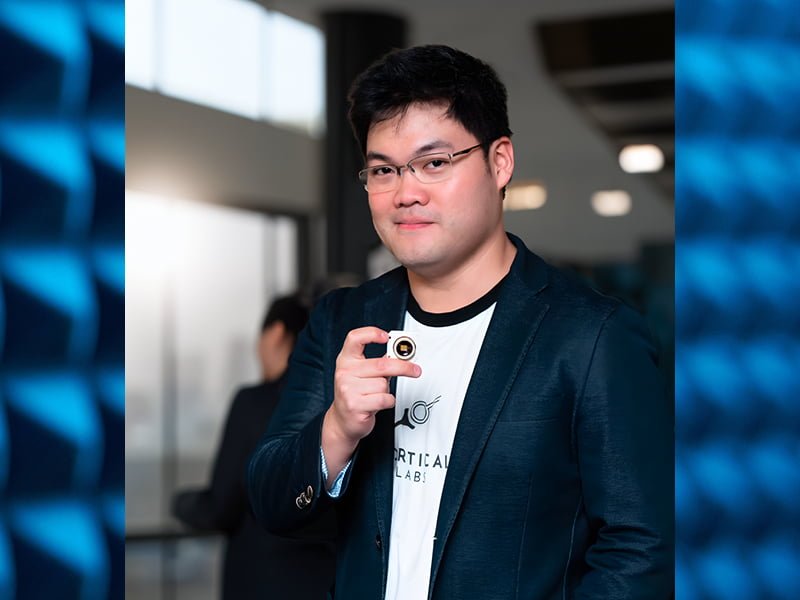“In our lab in Melbourne, we’re building the world’s first neural data centre,” explains Hon Weng Chong, whose fusion of biological computing with traditional tech has caught Amazon’s eye for its groundbreaking approach to energy and cooling.
Werner Vogels, the chief technology officer at global giant Amazon, paid a surprise visit to Cortical Labs, captivated by founder Hon Weng Chong’s groundbreaking work, which potentially holds the key to reducing the operational costs and environmental impact of cloud computing.
Cortical Labs achieved a world-first after training human brain cells to interact with a computer chip, stating, “Our approach is to observe nature and use neurons as the base unit for intelligence computation.”
The Aussie startup attracted massive attention after revealing neurons on a chip could learn to play the video game Pong by creating a closed-loop system.
While pioneering his primitive brain on a chip, his lab also discovered the potential use of stem cells for drug discovery and disease modelling.
Initially working with mice, they transitioned to human stem cells, leveraging their innate capability to model the world. This shift enhanced the performance of their biological computing system and may unexpectedly benefit medical science.
“The side effect of what we were doing with these human stem cells was the ability to start thinking about drug discovery and disease modelling.”
Their goal is to use the inherent predictive nature of biological cells to revolutionise how we understand and treat complex health conditions.
His deep tech venture could become an unexpected frontrunner in the global AI race, diverging from the established reinforcement and large language models of competitors like Google DeepMind.
“It could be the size of the silicon industry or bigger,” he said.

While the government favours cutting-edge developments in quantum computing and AI, his bid to build synthetic biological intelligence struggles to attract public sector funding despite its mention in a US strategic document and the substantial investment that follows overseas.
However, he also acknowledged substantial indirect support from the government’s R&D tax incentive, which offers a 40 per cent rebate, crucial for extending their financial runway during early development.
“Our technology faces both market and tech risks that can deter some investors,” he told James Riley, Editorial Director, during a recent Commercial Disco podcast interview. “But, the high stakes are exhilarating for others, offering the potential for a significant payoff and a strong technical moat.”
Blackbird wrote the founder’s first check for a tranche of 500,000 Australian dollars and later injected further capital. The company had almost closed down during the pandemic lockdown, forcing it to cut marketing and other budgets to focus on proving its approach could work.
Today, it has broadened its investor base, capturing the attention of Horizon Ventures, who led their latest funding drive round alongside Radar Ventures, Blackbird Ventures and In-Q-Tel, participating again and as co-investors.
Unconventional startups like Cortical Labs have some advantages to building world-class technology down under.
“The geographical isolation of Australia allows us to be focused and undistracted during scientific work,” said, “away from the competitive display often found in places like the Bay Area”.
Australia’s distance often means local startups have less funding at home, pushing them to look abroad for investment – a common path for innovators like Synchron, who, after making waves with their neural interface work, snagged the Paul Shetler Disruptor of the Year at the InnovationAus 2023 Awards.
Despite the financial hurdles, Chong highlights the excellent talent emerging from Australian universities and the favourable economic conditions, particularly the lower Australian dollar, which makes it an opportune time to build a tech startup in the country.
Cortical Lab’s most exciting innovations may stem from establishing his pioneering neural data centre in Melbourne, which is set to redefine the interface between biology and technology.
Unlike conventional research facilities, this centre would eliminate the need for a ‘wet lab’—a term typically used for laboratories where various chemicals, drugs, or biological matter handle liquid solutions.
The distinction here is crucial; instead of researchers needing to be physically present to manipulate and maintain living neurons, Cortical Labs aims to automate these processes.
The approach allows for complex care and remote interaction with biological neurons, leveraging cloud computing’s vast capabilities.
By utilising the cloud, the data centre can offer unprecedented access and control to researchers across the globe, who can train and study neuronal behaviours without the geographical constraints and resource-intensive setups of traditional labs.
Chong’s approach, which interests Amazon, not only streamlines research but also significantly slashes the energy demands of such operations.
“We need AI systems that use just a fraction of the energy current GPUs consume, and I believe our approach could be the solution.”
Do you know more? Contact James Riley via Email.
